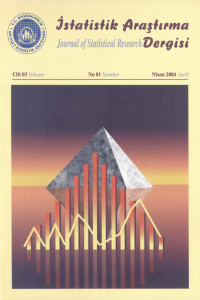The Use of Split Plot Designs in Industrial Design of Experiments and the Placement of Four-Level Factors into These Designs
Abstract
Commonly employed in many areas, design of experiment is used to study and improve the product and process performance in industry. The most widely used experiments are two-level multifactor factorial designs. These designs are run in a comletely random order. However, in some cases, it's neither practical nor possible to run these designs this way. Sometimes, it's hard and costly to change the levels of some of the factors. Or, there may be some physical restrictions on the process. When these are the cases, split plot designs, where factors are split into whole plot and sub plot factors, are used. In this paper, the main characteristics and confounding structure of split plot designs, which are composed of two-level factorials, are given. Then it's shown how to determine the fractionation with respect to the objective of the experiment. Additionally, if there are factors with four levels among the two-level factors, it's explained with hypothetical exaples how to place these factors into two-level factorials and how to choose the appropiate design among the alternatives.
References
- ANKENMAN, B.E. (1999), Design of Experiments with Two-and Four-Level Factors, Journal of Quality Technology, 31, 4, 363-375.
- BINGHAM, D.R. and SISTER, R.R. (1999), Minimum Aberration Two-Level Fractional Factorial Split -Plot Designs, Technometrics, 41, 62-70.
- BINGHAM, D.R. and SISTER, R.R. (2001), Design Issues in Fractional Factorial Split-Plot Experiments. Journal of Quality Technology, 33, 1, 2-15.
- BISGAARD, S. (2000), the Design and Analysis of 2k-px2q-r Split plot Experiments, Journal of Quality Technology. 32, 1, 39-56.
- BOX, G.E.P., BISGAARD, S. and FUNG, C. (1988), An Explanation and Critique of Taguchi's Contributions to Quality Engineering, Quality and Reliability Engineering International, 4, 123- 131
- BOX, G.E.P., JONES, S. (1992), Slit-Plot Designs for Robust Product Experimentation, Journal of Applied Statistics, 19, I, 3-26.
- DANIEL, C. (1959), Use of Half-Normal Plots in Interpreting Factorial Two-Level Experiments, Technometrics, 1, 31 -341.
- FRIES, A. and HUNTER. W.G. (1980), Minimum Aberratian 2k-p Designs. Technometrics, 22, 601-608.
- HUANG, P., CHEN. D. and VOELKEL, J. (1998), Minimum Aberration Two-level Split-Plot Designs, Technometrics, 40, 314-326.
- KOWALSKI, S.M. (2002), 24 Run Split-Plot Experiments for Robust Parameter Design, Journal of Quality Technology, 34, 4, 399-410.
- LENTH, R.V. (1989), Quick and Easy Analysis of Unreplicated Factorials, Technometrics, 31, 469-473.
- LOEPPKY, J.L. and SISTER. R.R. (2002), Analyzing Unreplicated Blocked or Split-Plot Fractional Factorial Designs, Journal of Quality Technology, 34, 3, 229-243.
- MONTGOMERY, D.C. (2000), Design and Analysis of Experiments, New York, NY: Wiley
Bölünmüş Parsellerin Endüstriyel Deney Tasarımında Kullanımı ve Dört Düzeyli Etkenlerin Bu Tasarımlara Yerleştirilmesi
Abstract
Birçok alanda yaygın bir şekilde kullanılan deney tasarımları endüstride ürün ve süreçlerin performansını incelemede ve geliştirmede kullanılmaktadır. En yaygın şekilde kullanılan deneyler iki düzeyli çok etkenli deneylerdir. Bu deneyler tamamiyle rasgele bir düzen içinde yapılır. Ancak bazı durumlarda deneyleri bu düzende yapmak pratik veya mümkün olmayabilir. Kimi zaman, etkenlerden bazılarının düzeylerinin değiştirilmesi zor veya maliyetlidir veya süreç üzerinde belirli fiziksel kısıtlamalar söz konusudur. Bu tip durumlarda etkenlerin ana parsel ve alt parsel olarak ayrıldığı bölünmüş parsel tasarımlar kullanılır. Bu çalışmada iki düzeyli çok etkenli tasarımlardan oluşan bölünmüş parsel tasarımların ana özellikleri ve karışma yapıları ortaya konulmuş ve deneyin amacına göre yapılacak kesirlemenin nasıl belirleneceği gösterilmiştir. Ayrıca etkenler arasında dört düzeyli olanların bulunması durumunda bu etkenlerin tasarıma nasıl yerleştirildiği ve uygun tasarımların nasıl seçildiği konusu hipotetik örneklerle açıklanmıştır.
References
- ANKENMAN, B.E. (1999), Design of Experiments with Two-and Four-Level Factors, Journal of Quality Technology, 31, 4, 363-375.
- BINGHAM, D.R. and SISTER, R.R. (1999), Minimum Aberration Two-Level Fractional Factorial Split -Plot Designs, Technometrics, 41, 62-70.
- BINGHAM, D.R. and SISTER, R.R. (2001), Design Issues in Fractional Factorial Split-Plot Experiments. Journal of Quality Technology, 33, 1, 2-15.
- BISGAARD, S. (2000), the Design and Analysis of 2k-px2q-r Split plot Experiments, Journal of Quality Technology. 32, 1, 39-56.
- BOX, G.E.P., BISGAARD, S. and FUNG, C. (1988), An Explanation and Critique of Taguchi's Contributions to Quality Engineering, Quality and Reliability Engineering International, 4, 123- 131
- BOX, G.E.P., JONES, S. (1992), Slit-Plot Designs for Robust Product Experimentation, Journal of Applied Statistics, 19, I, 3-26.
- DANIEL, C. (1959), Use of Half-Normal Plots in Interpreting Factorial Two-Level Experiments, Technometrics, 1, 31 -341.
- FRIES, A. and HUNTER. W.G. (1980), Minimum Aberratian 2k-p Designs. Technometrics, 22, 601-608.
- HUANG, P., CHEN. D. and VOELKEL, J. (1998), Minimum Aberration Two-level Split-Plot Designs, Technometrics, 40, 314-326.
- KOWALSKI, S.M. (2002), 24 Run Split-Plot Experiments for Robust Parameter Design, Journal of Quality Technology, 34, 4, 399-410.
- LENTH, R.V. (1989), Quick and Easy Analysis of Unreplicated Factorials, Technometrics, 31, 469-473.
- LOEPPKY, J.L. and SISTER. R.R. (2002), Analyzing Unreplicated Blocked or Split-Plot Fractional Factorial Designs, Journal of Quality Technology, 34, 3, 229-243.
- MONTGOMERY, D.C. (2000), Design and Analysis of Experiments, New York, NY: Wiley
Details
| Primary Language | Turkish |
|---|---|
| Subjects | Economics |
| Journal Section | Research Articles |
| Authors | |
| Publication Date | April 15, 2004 |
| Published in Issue | Year 2004 Volume: 3 Issue: 1 |


